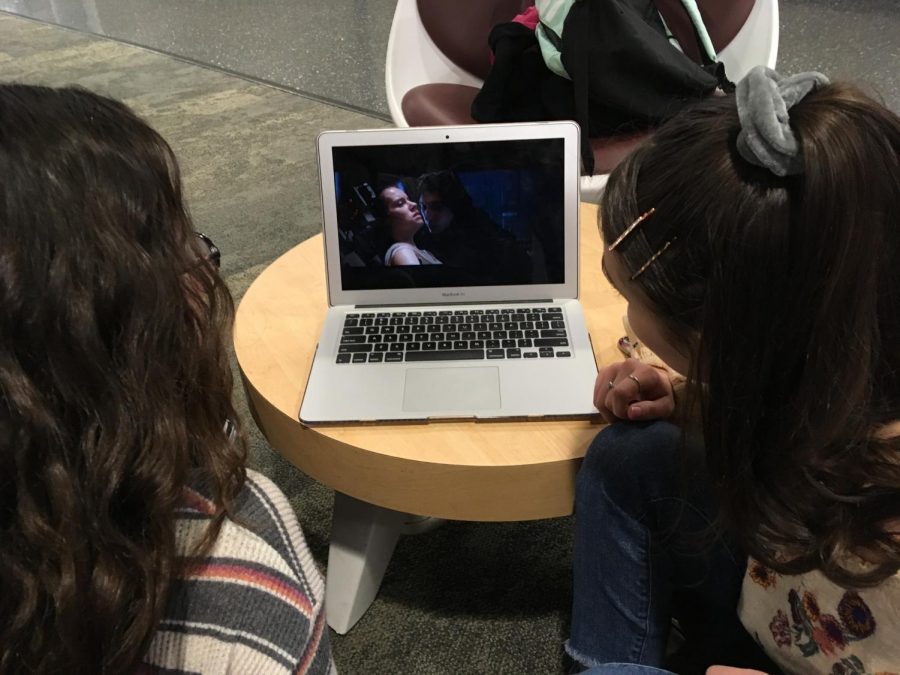Science-Fiction: Shattering Records and the Glass Ceiling
While spending free time at school, freshman Clarissa Theiss and junior Ella Simpson watch part of Star Wars: The Force Awakens. Science-fiction movies and shows have been defying gender roles and breaking stereotypes for decades. “I think that sci-fi films like Star Wars or action movies are more valuable for girls to watch; they are realistic in the sense that they empower women,” Simpson said.
May 22, 2019
May 4th, commonly referred to as May The Fourth, is a reference to the popular quote from the Star Wars franchise, “May the force be with you.” Many fans use the informal holiday as an excuse to binge their favorite movies and honor science-fiction as a whole. With a day devoted to celebrating the iconic series, it’s important to note the groundbreaking social advances that have occurred throughout the genre.
When discussing science fiction, Star Wars and Star Trek are often some of the first things to come to mind, often followed by other futuristic or dystopian films and television shows such as The Matrix, Firefly, and Interstellar. In addition to the stereotypical works within the genre, some of the most popular movies and shows right now also fall into that category. According to Merriam-Webster, science fiction (sci-fi) is defined as “fiction dealing principally with the impact of actual or imagined science on society or individuals or having a scientific factor as an essential orienting component.” By this definition, some of this year’s most popular blockbusters, including Marvel Studios’ Captain Marvel and Avengers: Endgame, would also count as sci-fi.
Science fiction has been a record breaking and groundbreaking genre for decades. Eight of the ten highest grossing films of all time are science fiction. Avengers: Endgame, which was just released on April 26, 2019, has already earned itself a spot as the 2nd highest grossing movie of all time; many people are predicting that it will soon overtake the top grossing film, Avatar, which is also sci-fi. While these smash hits have been shattering records within the past ten years, there’s something else that science fiction has been shattering since its beginning: the glass ceiling.
For as long as it has existed, sci-fi has been defying the stereotypical gender and racial roles, partially due to its often futuristic view of life where humanity has evolved beyond senseless hatred and prejudice against our own species. For example, an episode of Star Trek: The Original Series featured the first interracial kiss on television. All of the Star Trek shows have featured empowering female characters, such as Lieutenant Nyota Uhura, Counselor Deanna Troi, and Captain Kathryn Janeway of The Original Series, The Next Generation, and Voyager, respectively. In the Marvel Cinematic Universe, female heroes have been rising to prominence with the recently released Captain Marvel, featuring Academy Award winner Brie Larson in the titular role, becoming only the 39th movie in history to gross over a billion dollars.
The diversity and empowerment within science fiction are often inspiring to women and people of color. “I’m a big fan of Doctor Who. There’s often female companion[s] which are usually pretty powerful characters,” Beatrice Strelow, junior, said. For junior Grace Brennan, Star Wars characters such as Princess Leia have been especially inspirational. “The amount of diversity and the amount of different characters and types of characters [in Star Wars] that you can explore [is] pretty cool,” Brennan added.
Whether science-fiction is your cup of tea (earl grey, hot) or not, it is undeniable that it has had a great impact on so many people. So next time you turn on the television to watch your favorite sci-fi show or movie, take a moment to appreciate how groundbreaking and inspiring the genre has been.


